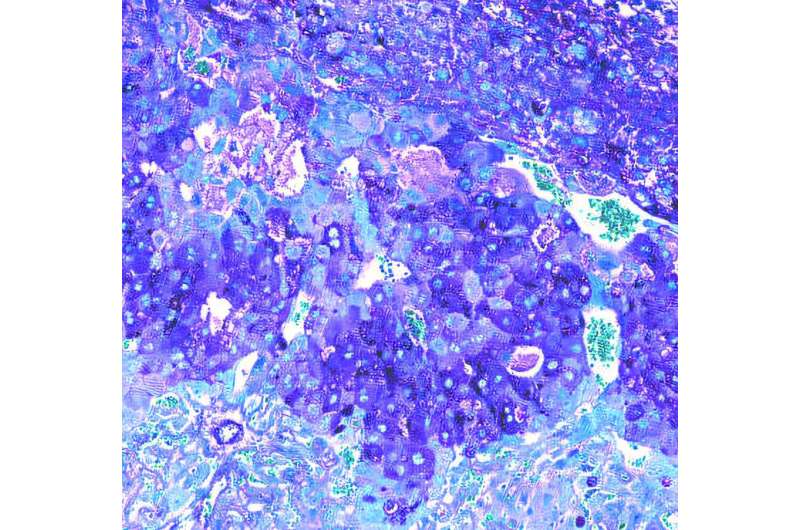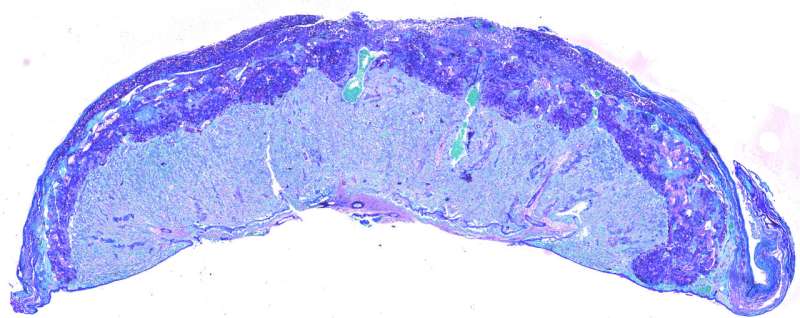Research led by the University of Cambridge has found the first clear evidence that the “good” gut bacteria Bifidobacterium breve in pregnant mothers regulates the placenta’s production of hormones critical for a healthy pregnancy.
In a study in mice, the researchers compared the placentas of mice with no gut bacteria to those of mice with Bifidobacterium breve in their gut during pregnancy. The research is published in the Journal of Translational Medicine.
Pregnant mice without Bifidobacterium breve in their gut had a higher rate of complications including fetal growth restriction and fetal low blood sugar, and increased fetal loss.
This gut bacteria seems to play a crucial role in prompting the placenta to produce pregnancy hormones that allow the mother’s body to support the pregnancy.
This is the first time scientists have found a link between the gut microbiome and the placenta.
The researchers say this paves the way for testing the mother’s gut microbiome to identify pregnancy complications like gestational diabetes, preeclampsia or miscarriage early—and then manipulating it with probiotics to improve the chances of a healthy baby.
“Our results open up an entirely new way to assess the health of a pregnant mother and her developing fetus by looking at the mother’s gut microbiome,” said Dr. Jorge Lopez Tello, first author of the report, who carried out the work while at the University of Cambridge’s Department of Physiology, Development and Neuroscience.

He added, “Everybody ignores the placenta—after nine months of pregnancy it just gets thrown in the bin. But now we understand more about how it works. In the future, pregnancy complications like gestational diabetes, preeclampsia, miscarriage and stillbirth might be prevented simply by adjusting the mother’s gut microbes to improve the function of the placenta.”
The placenta is a crucial organ during pregnancy that connects the mother to the fetus, and provides the nutrients, oxygen and hormones essential for healthy development of the baby.
Remote control
In the study, over 150 biological processes in the placenta—involving over 400 different proteins—were found to be different in mice with, and without, Bifidobacterium breve in their gut.
The mice with Bifidobacterium breve in their gut lost fewer of their pregnancies. Their placentas were better at absorbing and transporting nutrients, like amino acids and lactate, from mother to fetus—vital for fetal growth. Their placentas also produced more of the hormones important for pregnancy, such as prolactins and pregnancy-specific glycoproteins.
By studying mice, whose diet, activity and gut microbiome could be tightly controlled, the scientists can be sure their findings are not caused by other factors. Using mice allowed them to pinpoint the importance of Bifidobacterium breve—a finding that is also relevant to human pregnancies.
The scientists say more research is needed to understand how these “good” bacteria work within the human body’s full gut microbiome, and whether they could be manipulated in the gut without any negative effects.
Bifidobacterium breve occurs naturally in the human gut microbiome, but in pregnant women the levels of this “good” bacteria can be altered by stress or obesity. It is widely available as a supplement in probiotic drinks and tablets.

Healthier pregnancies
The babies of up to 10% of first-time mothers have low birth weight or fetal growth restriction. If a baby doesn’t grow properly in the womb, there is an increased risk of conditions like cerebral palsy in infants, and anxiety, depression, autism, and schizophrenia in later life.
“Our research reveals a whole new layer of information about how pregnancy works, and will help us find new interventions that can improve the chances of a healthy pregnancy for mother and baby,” said Professor Amanda Sferruzzi-Perri in the University of Cambridge’s Department of Physiology, Development and Neuroscience and St John’s College, senior author of the report.
“It’s exciting to think that beneficial microbes like Bifidobacterium—which naturally support gut and immune health—could be harnessed during pregnancy to improve outcomes. Using something like a probiotic offers a promising alternative to traditional therapeutics, potentially reducing risks while enhancing well-being in mother and baby,” said Professor Lindsay Hall at the University of Birmingham’s College of Medicine and Health, who was also involved in the work.
More information:
Placental endocrine function is controlled by maternal gut Bifidobacterium in germ-free mice, Journal of Translational Medicine (2025). DOI: 10.1186/s12967-025-07198-4
Citation:
‘Good’ gut bacteria can boost placenta for healthier pregnancy (2025, October 6)
retrieved 6 October 2025
from https://medicalxpress.com/news/2025-10-good-gut-bacteria-boost-placenta.html
This document is subject to copyright. Apart from any fair dealing for the purpose of private study or research, no
part may be reproduced without the written permission. The content is provided for information purposes only.

